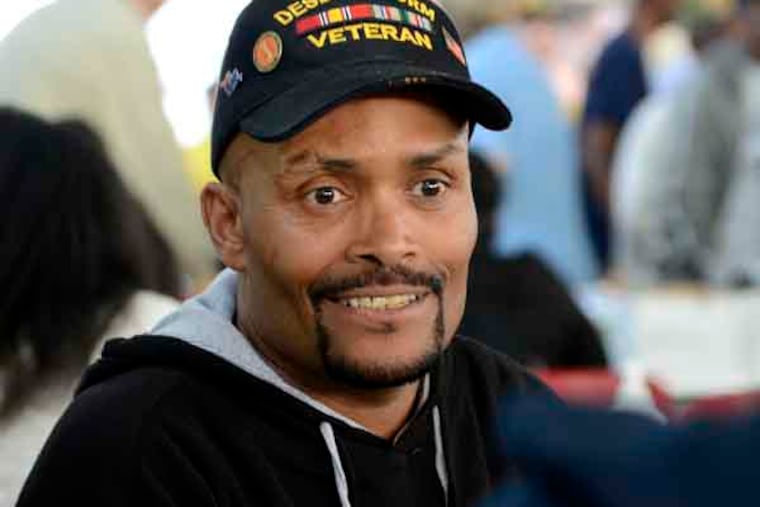Stand Down gives vets a step up
Jose Aponte, a 20-year Army veteran who served in Desert Storm and Granada, can't sit in dark movie theaters or crowded restaurants without breaking into a sweat. He can't sleep for more than four hours every seven days.

Jose Aponte, a 20-year Army veteran who served in Desert Storm and Granada, can't sit in dark movie theaters or crowded restaurants without breaking into a sweat. He can't sleep for more than four hours every seven days.
At his homecoming party in Pennsauken in 1997, he remembered how he panicked when he heard the township siren.
"I yelled, 'Incoming!' and immediately ducked under the table," Aponte said. "People were laughing at me, but they didn't understand. It was serious for me."
Sixteen years after returning home, he still suffers from combat stress - never letting his guard down and always scanning the room.
Aponte was among about 200 homeless veterans and those at high risk of physical and emotional issues at the Stand Down 2013 event at the National Guard Armory in Cherry Hill on Friday.
The name Stand Down comes from the military term for removing exhausted combat units from the battlefield to a place of security and safety to rest and recover.
"I want to know all the benefits that I'm entitled to, because I spent a lot of years in the military," Aponte, 51, said. He spoke about his life since the military over lunch provided at the event of spareribs, a hot dog, hamburger, and potato salad.
Co-hosted by the New Jersey Department of Military and Veterans Affairs and the Stand Down of South Jersey Committee, the event has been held locally in late September every year since 1996. Veterans are given access to health care, housing, mental-health screening and substance-abuse counseling, social services (food stamps and unemployment), and even a free haircut and clothing.
Staff from the Veterans' Administration Medical Center of Philadelphia set up tables in the armory, offering assistance. There were also volunteers from local VFWs, American Legion posts, and the Battleship New Jersey, among other military organizations, who outnumbered veterans by about 2-to-1. They wore bright yellow T-shirts with "volunteer" written on them and served as escorts to guide the vets through the lines and bond over lunch.
"With the volunteers involved, it adds another layer of community involvement," said Kathleen Craige, associate chief nurse for ambulatory care at the VA Medical Center at 38th Street and Woodland Avenue.
"We see a lot who use this [event] to engage with the VA staff in an informal setting to see what services are available to them," she said. "That way, they don't go to the [VA] medical centers blind or cold. They go through this and know the process."
Like Robert Lee, 65, who lives in a motel in Absecon. He served in the Navy and fought in Vietnam from 1969 to 1970.
Lee was told he needed to get his Veterans Affairs ID card replaced at a VA hospital. "That was very helpful," said Lee, who acknowledged life after Vietnam had been hard.
"Surviving in America hasn't been easy," he said, digging into his spareribs in the makeshift cafeteria. "It took about 20 to 25 years to adjust after Vietnam. It doesn't happen automatically."
The disappearance of manufacturing jobs has been the main issue for Kenneth Womack. He hitched a ride on a bus for veterans from Trenton to Cherry Hill.
Womack served in the Army from January 1975 to November 1977, which included a year at the 38th Parallel in South Korea, an active firing base. He lives in a rescue mission in Trenton and does maintenance work wherever he can whenever he can.
"Work is so tough to get these days that you have to turn to other veterans for help," he said. "This is the first time I've turned to other vets. It's a nice deal."
In addition to receiving donated clothes he stuffed into two large trash bags, Womack had his glucose level checked and got a free haircut and a $20 Wawa gift card, which he said he would use to buy cigarettes and food. He filled a small shopping bag with informational packets on counseling and housing services.
"I met a guy here who asked me if I could relocate to Coatestville, where he said he could get me some work," Womack said. "I'm going to give him a call."
Jim Maher, chairman of Stand Down of South Jersey, said he was pleased with the turnout. He said the good weather helped. It rained last year, keeping participants indoors. On Friday, clothing for the veterans was lined laid out on tables in the armory parking lot.
"The state Department of Military and Veterans Affairs is absolutely essential to everything we do," Maher said. "It would be better if there were no vets at all that needed what we can provide. But they came, and they told us they need help, and we do what we can to help them."
Aponte sought help for the first time a year ago. He had gone through a divorce and had lost his construction job and home.
He bypassed the housing table Friday because he was no longer homeless. Last year's Stand Down event helped him land an apartment in Camden. He picked out a new winter jacket and filled a trash bag with socks, underwear, and books.
He said he was studying to become an aviation mechanic and was seeking counseling.
He underwent eight surgeries on his right leg after getting hit by shrapnel in Desert Storm in 1991, but the emotional healing has been harder.
"There are no guidelines on how to live life after the military," he said. "I'm grateful for this.
"You feel like someone cares about you."